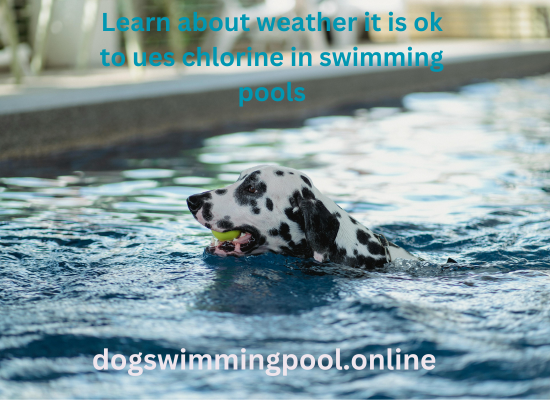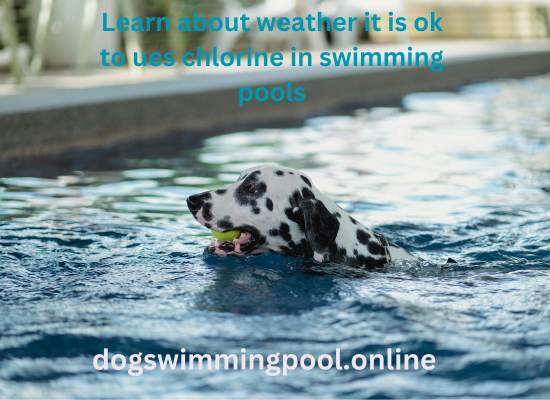Chlorine in swimming pools is generally safe for dogs at recommended levels (3-4 mg/l), but excessive consumption of pool water can cause health problems such as water intoxication. If you have a pet dog, you must have seen them swimming in the water because most dogs love to swim. The question arises as to how much.
chlorine should be used in the swimming pool. And are they safe for dogs? Although the use of chlorine in swimming pools is essential, it poses a considerable risk. Because dog’s eyes and skin are very sensitive, that poses a risk to them and raises the question of whether dogs should be allowed to swim in swimming pools given the effects of chlorine.

Drinking pond water can be dangerous for dogs
The recommended level in swimming pools is between 3 mg/l. and Center for Disease Control and Prevention According to the CDC, only 4 milligrams per liter of chlorinated water is safe for dogs. if your dog drinks a small amount of swimming pool water it’s safe for him. it won’t harm him but if he drinks large amounts of chlorinated water it can cause harm to him.
If the dog gets into the habit of drinking water from the pool, then it starts showing the possibility of erosion in its esophagus. Your dog’s health can deteriorate due to water intoxication. That will lower their blood sodium levels too much. so you need to pay close attention to that. You should have separate water for the dog to drink so that your dog is protected from toxic pool water.
Some precautions to take to protect your dog while swimming
You need to keep this in mind to keep an eye on your dog while it is swimming, it is important to take some precautions to keep it safe.
Read more: Best Water Pools for Dog Swimming What You Need to Know
i.Maintain and clean your pool well

You need to clean the swimming pool regularly daily it should not contain any chemicals that may cause danger to them And yes, chlorine levels are very safe for dog swim.
ii. Store chlorine and other pool cleaners in a safe place
You should keep your pet away from pool cleaners and chlorine tablets Chlorine levels. in swimming pools may not harm a dog, but any concentrated chemical or chlorine up can be dangerous and even fatal to a dog.
Read more: Choosing the Best Swimming Pool for Dogs
iii. Keep water available for the dog to drink
Provision of fresh water for his drinking So that he does not drink pond water this will also help him to protect himself from heat stroke.
iv. Watch for irritation and signs of illness
And their eyes get bad and the eyes get red and there may be cough and so on And watch for all these signs and remove the dog from the pond.
v. Rinse your dog quickly after swimming
After swimming, rinse your dog thoroughly to remove chemicals and chlorine from the water, and also clean his ears with a soft towel. This will help prevent the chances of infection.
Read more: Get complete information about swimming pools for dogs.
What to do if a dog has any adverse reactions while swimming in a chlorine pool
swimming in chlorinated water can cause skin irritation and water intoxication for your pet. These symptoms are more common. when your pet drinks pool water at a very high rate. Here are some symptoms of water intoxication.
- Lethargy
- Drooling
- Restlessness
- Loss of coordination such as stumbling or staggering bloating
- Dilated pupils
- Glazed eyes
- Pale gums
- If all these symptoms persist in your dog, consult a vet immediately.
Summary
Importance and use of chlorine in swimming pools And why is chlorine important in swimming pools? The harms of drinking chlorinated water and such precautions are also included. Which will keep your pets safe while swimming in the swimming pool. If you experience any adverse reactions while swimming, consult a doctor immediately.
Read more: Choosing the Best Plastic Pool for large dog swimming
FAQS
1. IS swimming pool chlorine bad for your skin?
Chlorine in general can cause skin irritation and dryness, especially for people with very sensitive skin. Chlorine can strip natural oils of exposure, causing dryness and itching to reduce skin irritation, it is recommended to shower before swimming and use a moisturizing lotion after swimming, and if possible, wear a protective swimsuit.
2. Is it safe to go in a pool with chlorine?
Most chlorinated pools are safe to swim in Chlorine is used. if it is appropriate and ensures that the water is properly purified without harming the swimmers. Since excessive use of chlorine can cause skin irritation and irritation, pool maintenance is essential to keep the pool safe.
3. Should you put chlorine in your pool?
Yes, chlorine is necessary to keep swimming pool water at its best, or it helps to keep the water completely free of harmful bacteria, viruses, and germs. Chlorine also helps prevent the growth of chlorine and to ensure the cleanliness of the swimming pool while avoiding most chemical exposures, it is important to maintain an adequate level of chlorine, usually between 1.0 and 3.0 ppm.
4. Is chlorine in swimming pools harmful?
A swimming pool is usually perfectly fine. if used properly if chlorine is used in excess in a swimming pool, it can cause skin or eye irritation because chlorine is such a strong chemical that if not properly balanced, it can react to cause harm. And regularly test and monitor chlorine for swimming pool safety.
